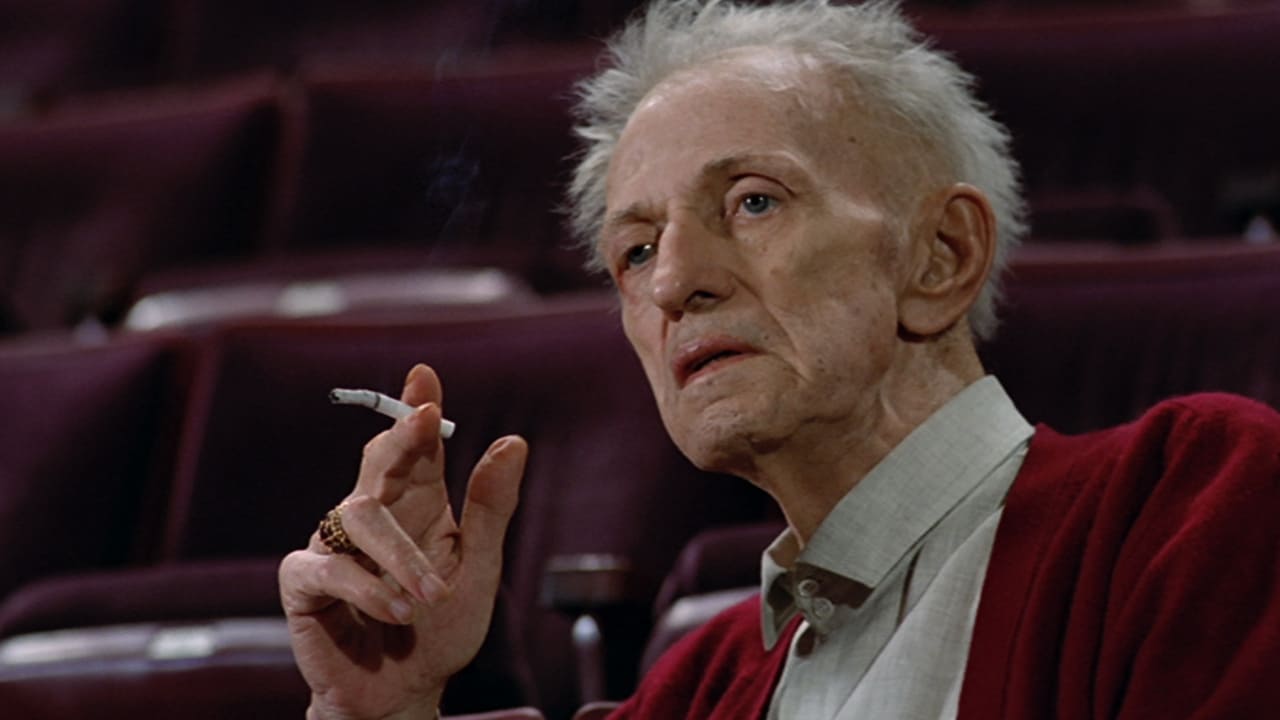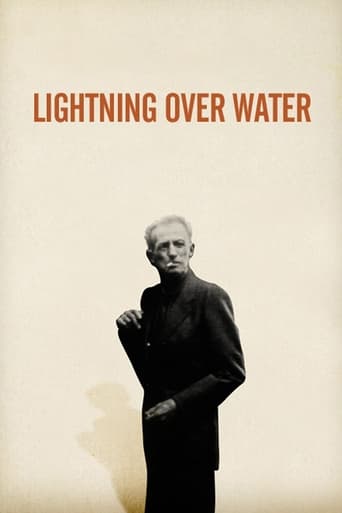

Self-important, over-dramatic, uninspired.
... View MoreThis is a coming of age storyline that you've seen in one form or another for decades. It takes a truly unique voice to make yet another one worth watching.
... View MoreBlistering performances.
... View MoreIt's simply great fun, a winsome film and an occasionally over-the-top luxury fantasy that never flags.
... View MoreNeither of the two protagonists in this pseudo documentary were served well here - Wem Wender and Nicholas Ray but shame particularly on Wender who was filming the last few months of Ray's life.Surely there was more to Mr. Ray than what was portrayed here? Could he not have had him commenting more on his vast body of work, his marriages, his children?It all felt highly exploitive and downright contrived but perhaps Mr. Ray had put restraints on Mr. Wender's access to his thoughts and feelings.But all I'm taking away from this is the nightmarish chain-smoking of Mr. Ray (everywhere, hospitals, Vassar, cabs - yeah it was 1979!) and the endless, hacking, breath-gulping, rasping sounds of his coughing from lung cancer.1 out of 10. To see a wonderful documentary on death and dying watch "Dying at Grace".
... View MoreHalfway through the movie, I told my girlfriend who wasn't watching it, "this movie could be called 'Watch Nick Ray smoke'". What is this movie about? That's the question, which is the subject of this movie. One man, the legendary Hollywood director Nick Ray, is dying and the other, up-and-coming German director Wim Wenders, is trying to help him make a movie. They can't seem to figure out what the movie should be about. Ray thinks it should be about an elderly painter, unable to recapture past success, who robs his masterpieces from museums and replaces them with his own forgeries. The artist has a wife who is 40 years younger than he is, and he's dying from cancer. Wenders urges him to drop the fictional facade, since the character is obviously Nick Ray himself. Watching it, we're not sure if Ray and Wenders are genuinely disagreeing about the film's subject, or if this is all scripted and actually the film itself.And so the subject of the film is the idea of the fictional barrier or the artist's personal incentive and responsibility towards the art. It's a great statement about Ray's method of work as a director, the impulsive nature of it and his great insight into working with what he calls the "high caliber" talents of Hollywood, and we can't really disagree with him seeing the names -- Bogart, Mitchum, Dean. Ray offers that the personal investment and connection of the actor to the character and the situation is what anchors the performance and makes it great. In a standard narrative film, the separation between the actor and his/her role could thus be seen as even more the trick than it first appears to be, and much on the same order of trickery as this film itself, with its obvious "documentary" overtures and its real documentary value existing in an uneasy middle ground. As we watch Nick Ray basically die before the camera, Wenders offers that the merciless eye of the camera may capture more of the process of disintegration than the eye itself. That's what makes watching this film such a sad experience, particularly for myself and others who are fans of Ray but I'm sure for Ray's family in a totally different way, and for those who might never have heard of him in yet another way.Wenders' film touches upon very big questions and feels like it's getting closer to some very vital territory, but it never really takes off and soars. There's no moment of clarity or consciousness. Instead the very lack of clarity becomes the subject of the film even to its conclusion with a (probably faked) confrontation between the crew with some urging to burn (Ray's?) boat so that it would provide a fitting climax for the film. Ray wanted to make a film about self-examination, but Wender's "Lightning Over Water" ends up feeling like a sad and perversely voyeuristic experience with plenty of self-examination and no self-realization. I have to say that it sobered me up quite a bit, and it's quite an experience of a film for me, but I'm dubious about whether it's really the film that Ray and Wenders hoped that they were making.
... View MoreThe more that I watch of the 1970s New German Cinema (Das Neue Kino) the more manifest it becomes that, despite the usual namedropping of Wim Wenders, Rainer Werner Fassbinder, and Werner Herzog as a trio, it truly was only a one man movement, and Herzog is and was so far above and cinematically dominant over his two rivals that to speak of the lesser two in the same breath as Herzog is like mentioning the Gawain poet whilst going on of John Donne's or William Shakespeare's poetic skills.This is abundantly clear in lightweight films like the 1980 pseudo-documentary Lightning Over Water, directed by Wenders- with a meaningless co-credit to his idol Nicholas Ray, whose death is central to the film, and who, along with Wenders, is credited as a co-writer. In a sense this equivalence is apropos, since Wenders and Ray are both, at best, second tier filmic talents. After Johnny Guitar and Rebel Without A Cause- the James Dean teenaged sudser, are there any real films of note that Ray directed? And, neither of the two films mentioned is anywhere near greatness. The only reason that this misshapen mess of a film was made was because Ray was something of an idol to Wenders, and dying of cancer, not long after the two men met filming The American Friend a few years earlier.Yet, none of this camaraderie nor artistic affinity comes through in the film for we see only one brief movie clip, from Ray's Lusty Men, we get no background on Ray's life, and all we are subjected to, during the film's VERY LONG ninety minutes, is Ray's wheezing, hacking, spitting, whining, and assorted other bodily noises as he lies about, waiting to die, as Wenders narrates that this or that moment made him feel bad. Add to that conversations that are supposed to be 'real' yet are clearly not a part of the 'internal documentary,' and some poorly acted and staged scenes that are meant to illuminate the tale of Wenders' trip to Ray's bedside, while also trying and failing to break down narrative conventions, and you have a genuine disaster . The film was shot both in film and video, but this mixed media adds nothing of consequence to the meaning nor import of what it captures. I guess the video adds a bit of realism to Ray's decline, but the fact is that there really is nothing here besides such a minor addition. Let me sum up the film this way: imagine sitting at a funeral home and listening to strangers ramble on about the neighbors and old friends of a loved one that you know nothing about. And to top it off, the storytellers are dreadful at their craft, and furthermore never complete any of the tales. Worse, there is no connection to the audience for they are telling tales only they know anything about. Thus the viewer feels no empathy for Ray nor Wenders. Even more annoyingly, there are some shots that are so amateurish and badly composed that one has to wonder if Wenders deliberately screwed up his film to try to 'show' that he was so upset that he could not do his job properly; in a sense employing faux amateurism to try to cynically manipulate viewers into jerking tears over his dead friend.Regardless of whether or not this is the case, in the end, all the manifestly feigned experimentalism is just dull. Not even some well composed shots of the bygone Twin Towers can elicit genuine emotional responses. Then comes the penultimate scene of Ray, near death, lecturing Wenders, who inexplicably is lying in bed in a fake hospital scene. This scene is just painful to watch, for Ray's out of his mind and merely rambling. Wenders shows this for seven minutes and the result is borderline pornography, full exploitation, and plain old sadistic, because nothing is gained. I felt a minor anger and contempt for Wenders during this, but it passed, as all else in this empty vessel does.Yet, did Wenders really think that this sequence would illumine death- Ray's or any others? Apparently so, which only demands that the flaw of pretension be added to this film's artistic sins, which include treacly sermonizing, such as when Wenders asks, in all apparent seriousness, such banal queries as whether or not telling the truth is dull or exciting. All in all, Lightning Over Water is a bad film, an inconsequential and failed extension of the documentary form, a weak statement on art and/or death, and not even a good record of the late 1970s fashion nor culture. It is basically a pointless vanity project that never coheres, for it has no narrative nor emotional cement to hold its flimsy structure together. This fact provokes only two real questions- who was more vain, Ray or Wenders? And did the right filmmaker die?
... View MoreThis is not a movie for Wenders fans as much as it is for Nick Ray fans. In fact, I wouldn't recommend it unless you felt connected to the director. And I don't mean that you've happened to rent Johnny Guitar, In a Lonely Place or They Live By Night. See it if you saw a theme in Ray's work, one that made you go back and learn about his life. See it if you re-watched his films, trying to understand every cut and what it told you about the man behind the camera. See it if it bothers you that he will never make another film. Because in Lightning over water Nicholas Ray invites you to share his death with him, and, if you see it, you must be prepared to grieve. I saw this movie late one night in my college dorm room (a college with a featured role in the film, but that is merely tangential). I didn't let anyone watch it with me. The previous summer my grandfather had died in the same drawn-out manner. He was surrounded by family from the time of his diagnosis to the time of his death. Wenders and his crew are Nick Ray's family -- a love of the director's work is the blood connecting them. Wenders carries a camera with him because he knows that others -- even those who never heard of Nicholas Ray until he was dead for 18 years -- have the same blood in them. Wenders gives us the chance. But it is Nick Ray who we come to see.
... View More